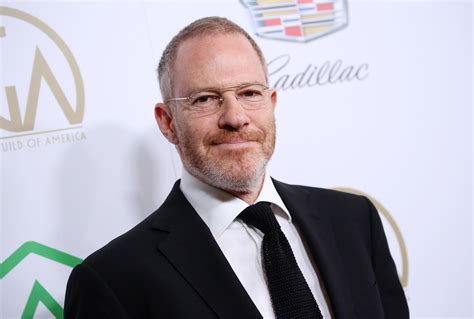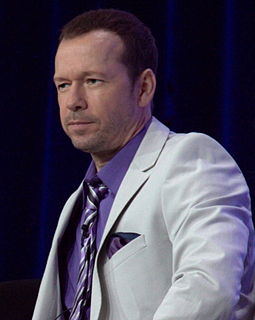A Quote by Toby Emmerich
A movie needs to have a must-see quality among the people you are targeting. Also, make movies at a responsible budget so that if you attract your core audience, and they show up in the first few weekends, the economics will work.
Related Quotes
Nowadays the movies that people are going to see in the theaters are the big-event movies, like Spider-Man or something, or they're 25-year-old models who are vampires, or they're very broad comedies, or they're standard action movies. So if you're going to work for a studio and do a movie for the budget that the movie needs, those are the kinds of movies you'll be in.
Making a show is also economics. Because the irony is, or the shame of it is, you cannot create a show instantaneously. It needs to be massaged. You need to see who is relating to who. How is it working with the audience? You need to give it a chance for the audience to find it, because there are so many outlets. And the audience doesn't know where to go.
The movies have been so rank the last couple of years that when I see people lining up to buy tickets I sometimes think that the movies aren't drawing an audience - they're inheriting an audience. People just want to go to a movie. They're stung repeatedly, yet their desire for a good movie - for any movie - is so strong that all over the country they keep lining up.
Doing this web show - people underestimate what it takes to do a web show successfully. They underestimate the amount of work that you have to do to get it to your audience after it's made. I think you have to work so much harder, especially if you don't have a huge budget. You have to know how to get your audience engaged, because the Internet is so distracting, and there are so many choices. People, even if they love your show, will forget to go back for episode four, because you know, people are busy.
When you raise the budget, you make creative compromises. The higher the budget goes, the more cuts in your movie happen. When people talk about how movies are watered down, that's a direct reflection of money and budget. The less money you spend; the more risks you can take. That doesn't mean it will be successful, but at least you can try different stuff. The higher your budget is, the less you can do that.
I was also a fan of the first one Saw movie. I knew there was a danger in doing the sequel, especially like this. They have such a core audience for the Saw movies. The fans of the movie actually demanded a sequel. They were on the internet going crazy. I don't even go on the internet. I don't even know how all this stuff happens. But they wanted it and one the one hand that's good, because you know there's an audience.
I grew up in LA, and I don't think I've seen LA onscreen in a way that felt real to me. There are definitely movies, but they are few and far between. I wanted to see a movie that was set in LA that wasn't about the film industry. LA is such a lonely place to be alone. In New York you can just walk out and be among people. You're on the subway among people, you go to cafés, you can talk to people. In LA, no one talks to each other, you're in your house, you're in your car, even when you take walks there's no one on the street.
But one of the rules I don't like to break is we still do - 95% of our movies are low budget. We're offered bigger, larger budget movies to produce a lot, and we don't do them. That's not to say there aren't exceptions, there are a few exceptions, but I try and stick by the rules that produce what I think is the highest quality, most innovative work and try and let the rules go that make us feel like we're retreading.
Everybody who's making the movies needs to work hard to make sure they're good. And if you don't show up and see the movies and support them financially, no one is going to make them. It's going to change unless it makes money. That's the long and short of it. You have to give in to the fact that it's a business.
One thing we haven't mentioned is something everyone should understand very clearly. Look at the budget that was invested in 'Avatar': who in China has that kind of money to spend on making a movie? So we as Chinese filmmakers should work together to make Chinese movies that can compete as best we can for Chinese audiences, not make lousy movies, but make the best we can for that audience. Concentrate the money, the talent we have on making good movies [for China].
It's basically how I choose movie roles. Would I like to see this movie? Is this movie important? Why would I do this? And Headhunters is a movie that I would like to see in the cinema. And when it's sold to 50 countries or whatever, for me it's a great deal. I make movies for an audience so if that audience grows, I feel really honoured and thankful for it.
In the long run, the quality of your work is all that matters. That is your only resumé. Be professional. Make sure your editor or publisher can always reach you. Do what's asked of you if your conscience can bear it. But know that, five years from now, as fans or prospective employers are looking over your published pages, no one will care that this story sucks because the publisher moved the deadline up or because the editor made you work an android cow into the story. All they will care about is what they see in front of them, and they will hold you responsible for it, no one else.
People say that you can't change people's minds with a movie or book, but how do they get formed in the first place? They get formed by what we see and read. In a certain way, movies are ahead of their times. People make them and don't really know if the audience will respond to them. Once in a while, they do.
The first thing I did as a child was draw. I wanted to make animated movies. I think Disney's 'Cinderella' was the first movie I ever saw. 'Peter Pan' was the first movie I ever saw in the movie theater. I grew up with 'Dumbo' and 'Pinocchio' and 'Sword in the Stone.' Those were the movies I wanted to make.


































